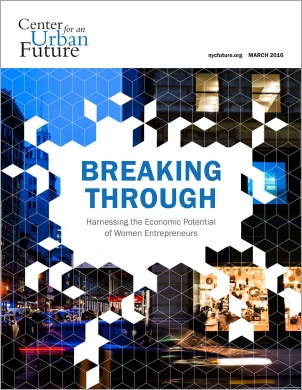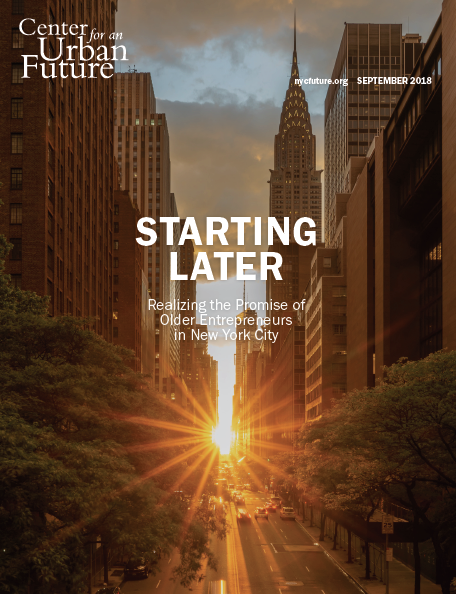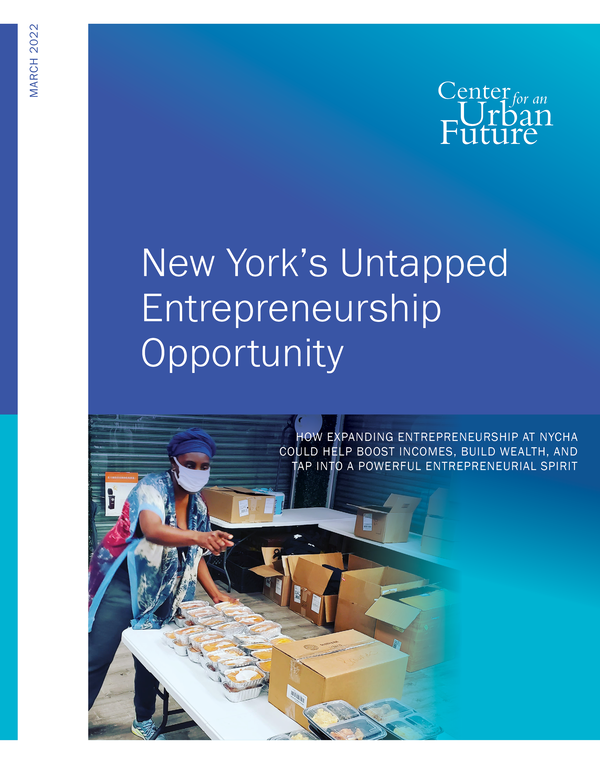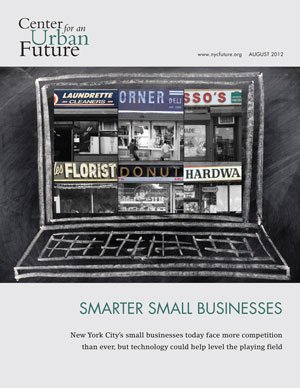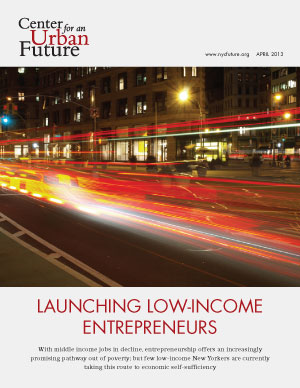The following are the recommendations from Breaking Through.
Read the full report (PDF).
Women entrepreneurs have already become a major force in New York City’s economy, with the number of businesses founded by women on the rise in every sector of the city’s economy. Yet, New York—like virtually every other city in America—has only begun to tap the enormous potential of women entrepreneurs across the five boroughs. In the months and years ahead, there is a clear opportunity to expand the overall number of women entrepreneurs and also ensure that more women-owned businesses grow to the next level. Doing so will strengthen the city’s economy, create jobs and bolster neighborhoods across the city. While the de Blasio administration WE NYC initiative is a major step in the right direction, more could be done—by government as well as private industry and nonprofits. To that end, we propose the 22 achievable policy recommendations.
Develop New Initiatives to Help Existing Women-Owned Businesses Grow
Not every woman entrepreneur wants to expand her business, and many of the small-scale firms owned by women simply don’t have much potential for growth. But in a city where 91 percent of all businesses owned by women—376,000 in all—do not have any employees, there’s undoubtedly an opportunity to help scale up some of these enterprises. New York City has a number of good small business assistance programs, including initiatives run out of the Department of Small Business Services (SBS) and the Economic Development Corporation (NYCEDC), and others managed by nonprofit small business assistance providers. But the majority of these programs are focused on entrepreneurs starting new businesses. The de Blasio administration should refocus its toolkit of small business programs to include more initiatives that help existing businesses to grow. As part of this, it should also include some programs specifically focused on supporting the growth of women-owned businesses and make sure all programs are aggressively marketed to female entrepreneurs. Some specific ideas include:
-
Launch a program focused on supporting—and scaling up—home-based businesses
In a city where thousands of female entrepreneurs run home-based businesses, the de Blasio administration should create a suite of support services for these small-scale enterprises. This should include targeted advice and resources designed to strengthen home-based businesses across the five boroughs, including those that have no intention of growing into significantly larger businesses. But it should also include new efforts to help some of the city’s many home-based entrepreneurs to increase their revenues and expand beyond their home. One model worth exploring is the Home-Based Transition Grant Program in York County, VA, which assists home-based businesses that are poised to expand into commercial space by providing $2,000 grants that could be used to cover some of the new costs in this growth period. However, simply offering workshops or webinars specifically geared to home-based businesses—on everything from marketing with social media to legal and tax issues—would be an important step in the right direction. The city might also promote the use of social networks to connect home-based entrepreneurs, allowing them to share resources or best practices and help each other. -
Expand awareness of existing programs that could help women grow their business
It’s not enough to merely offer good business assistance programs; those programs also need to be marketed sufficiently. One city program that could benefit from additional marketing is Strategic Steps for Growth, a small business capacity building program developed by the Boston-based nonprofit Interise. Strategic Steps for Growth provides minority and women business owners with the knowledge, know-how and relationships they need to grow their business. It is one of the few standout business assistance programs in the five boroughs that’s specifically focused on helping small firms get to the next level. Using Interise’s curriculum, the program now operates in 70 cities across the country, run by local partners that are licensed to deliver it. Results are impressive, but the Strategic Steps for Growth program in New York consistently operates at less than full capacity. The program, which is operated by SBS and the Berkley Center for Entrepreneurship & Innovation at the NYU Leonard N. Stern School of Business, can accommodate 18 business owners, but enrollment averages between 15 and 16 firms in each cohort. The de Blasio administration should initiate an extensive marketing campaign for the program. The administration should also provide full funding for the program which would allow SBS to reduce or eliminate the $1,500 fee it charges for Strategic Steps for Growth as a way to increase interest in the program. Six other Interise partner programs, soon to be seven, with NYCEDC launching a new cohort in the Bronx in May, now operate in the New York City area and all have been able to secure funding so that they do not need to charge a fee. -
Establish a Female Entrepreneurs Growth Innovation Fund
As a way of injecting new approaches to help small women-owned businesses grow, the de Blasio administration should partner with philanthropic or corporate funders to establish a new fund that would support five innovative programs—one in each borough—specifically focused on helping more small businesses owned by women to grow into medium-sized and large businesses. The innovation fund might include a competition that would be open to proposals from nonprofit small business providers, businesses and entrepreneurs. -
Expand export opportunities for New York’s women-owned businesses
According to research from the National Women’s Business Council (NWBC), 99.5 percent of the nation’s women small business owners do not have sales outside of the United States. It’s likely that the numbers are similarly high for New York-based businesses. The de Blasio administration should seize on this untapped opportunity and create new programs designed to increase the number of New York-based businesses that export their goods and services. These programs should specifically target female entrepreneurs in fields such as fashion, architecture, food manufacturing and crafts making. -
Expand the number of certified Women Business Enterprises
Winning a government contract can be a springboard to growth for small businesses. But currently only 1,481 companies in the city are even certified as Women Business Enterprises (WBEs), a designation needed to apply for the city’s Minority and Women Business Enterprise (M/WBE) contracting program. The de Blasio administration should increase the number of certified WBEs by at least 50 percent over the next five years, and take aggressive steps to identify more women owned businesses across the five boroughs that have the potential to become a government contractor. This should include extensive outreach, and partnerships with community-based organizations—including microfinance groups, local development corporations (LDCs), Small Business Development Corporations (SBDCs), Business Improvement Districts (BIDs) and chambers of commerce—that have more extensive relationships with businesses throughout the city. With just 78 registered WBEs in Staten Island, 125 in the Bronx, 259 in Queens and 309 in Brooklyn, city agencies should specifically look to increase outreach and recruitment efforts in communities outside of Manhattan. -
Double the number of female contractors who get city contracts by 2020
It’s not enough to simply increase the number of registered WBEs. The de Blasio administration should set a goal of doubling the number of women owned businesses that win contracts with city agencies over the next four years, and put in place practices and programs that help them reach that target. The federal government sets a goal of awarding five percent of its contracts to women-owned businesses, and they have nearly reached that target. But in New York City, just 1.5 percent of city spending goes to women owned businesses. In a city where 40 percent of all businesses are owned by women, this should be achievable. To get there, to the city will need to go beyond simply holding networking events, conferences and trade shows where women entrepreneurs have a chance to schmooze with prime contractors. As one city contracting officer told us, these events don’t always result in the meaningful relationships that are needed by women who are trying to break into government contracting. Contracting officials at city agencies should do more to foster those relationships. One way is to affirmatively set up meetings between women entrepreneurs whose businesses are at the point where they can handle a government contract and prime contractors. Additionally, the administration should consider two recommendations made in 2015 by City Comptroller Scott Stringer: hold prime contractors accountable for complying with M/WBE requirements and explore expanding M/WBE goals further down the vendor supply chain. -
Help New York City’s certified WBEs access other government contracting and private sector supply chain opportunities
Companies owned by women that have been awarded city government contracts may be well-positioned to break into the corporate supply chain or obtain contracts with the federal and state government, all of which could help expand their operations. The de Blasio administration should target these firms—as well as male-owned companies that have won city contracts through the M/WBE program—and make sure they are aware of these opportunities. At a minimum, they should ensure that companies registered for the city’s WBE program are also registered for federal and state M/WBE programs as well as the city’s Corporate Alliance Program, which helps city businesses access supply chain contracting opportunities. -
Ease restrictions that prevent successful child care businesses from expanding
The number of child care businesses in New York City has been on the rise for several years, providing entrepreneurial opportunities for hundreds of female entrepreneurs, including many from immigrant and minority communities. But while some of these entrepreneurs are running highly successful businesses with large waiting lists, city officials recently adopted regulations that make it nearly impossible for anyone to open up a second or third child care establishment. While ensuring safety is paramount, city officials should re-examine the regulations and consider finding a middle ground that would allow some of these businesses to open more than one child care center. At the same time, the city should continue to support existing programs—like the ones offered by BOC and WHEDco—that help home-based child care operators to think of themselves as business owners and develop the financial skills needed to succeed and grow.
Develop programs to support older women entrepreneurs
With the city’s population aging rapidly—the number of residents 65 years and over is expected to increase by 41 percent between 2010 and 2040—New York could be on the verge of a boom in older entrepreneurs. The biggest opportunity may be with older women. Indeed, today women account for 60 percent of all New Yorkers who are 65 and older—626,079 out of the city’s 1,046,671 seniors. The city’s Economic Development Corporation (EDC) and Department of Small Business Services should develop a new program to encourage and support older entrepreneurship across the five boroughs. They should also market existing programs for small business owners and entrepreneurs to older adults across the city, possibly through partnership with organizations that work closely with older New Yorkers, such as AARP.
Create incentives for banks and alternative lenders to make more small loans
While women entrepreneurs at all levels struggle to access capital, the experts we interviewed for this report told us that the biggest gap is for loans under $150,000. Microlenders are providing a number of very small loans at the bottom of this range—usually under $10,000. But many women-owned businesses are looking for loans of $50,000, $75,000 or $125,000. Unfortunately, there’s currently little incentive for banks to make loans at these levels. It costs the same for banks to process these small loans as it does for a $5 million loan, yet the profit potential is significantly lower and the risks are typically much higher. City, state and federal government officials should create new incentives that entice lenders to take a closer look at loans in this range. Some ideas include:
-
Expand the city’s Capital Access Loan Guarantee program
The city’s Capital Access program guarantees up to 40 percent of eligible loans from participating lenders to small businesses. By providing the guarantee, the city reduces the risk for lenders and thus helps them make small loans they wouldn’t otherwise. But there are two things the de Blasio administration could do to increase the number of loans made through the program. First, it should follow the lead of the SBA, which eliminated fees that it had imposed on lenders for every loan made through its loan guarantee program. According to Erin Andrew, director of the SBA’s Office of Women’s Business Ownership, eliminating the fees “provided an incentive for [lenders] to give out a smaller dollar loan, and we’ve seen more women access capital as a result.” If New York City eliminated the fees it charges to lenders participating in its Capital Access program, it could have a similar impact. Second, the de Blasio administration ought to consider extending the guarantee to 60 or 70 percent. Doing so would encourage lenders to make more small loans. -
Give banks CRA credit for making very small business loans
Bank regulators should make it apparent that banks will get credit under the federal Community Reinvestment Act (CRA) for making small loans to women and minorities with interest rates under 10 percent. Because CRA rules are currently unclear about this, banks often use their CRA funds for other purposes.
Ensure that more women entrepreneurs whose loan applications are rejected by banks get referred to a microlending institution for access to capital, credit building assistance and other business support services
Some of the experts we interviewed for this report told us that when a woman applying for a small business loan is turned down by a bank, they are less likely than men to come back to the bank later on and re-apply for a loan. Thus, it’s important for women entrepreneurs to learn about other, nontraditional lending opportunities that may be available to them, such as microloans. Banks can help by making it a standard practice to refer clients who have solid prospects but may not meet all their requirements to microlending institutions, which may be able to provide a small loan or work with the entrepreneur to improve their credit rating and gain financial management skills. In many ways it is in banks’ interest to make these referrals. After all, if they help a client get a microloan, the client is likely to set up various accounts with the bank. There’s also a good chance the client will be ready to come back for a traditional bank loan in a year or two, after developing a solid credit history with the microlending organization. But while many banks do make referrals to microfinance organizations, there’s clear potential to make the referrals more commonplace.
Begin offering child care services at some of the city’s small business centers, accelerators and incubators
Many women entrepreneurs who run a business while juggling family responsibilities may be discouraged from taking advantage of counseling services that are currently available to small business owners and aspiring entrepreneurs simply because child care services are not available. With this in mind, the de Blasio administration should create a competitive grant program that provides funding that enables a couple of the city’s existing small business centers, accelerators or incubators to begin offering on site child care services.
Recruit experienced women business owners and executives from every industry sector to be mentors
Virtually every entrepreneur we interviewed for this report cited the importance of mentors and the advice, industry knowledge and personal support they provide. That includes lawyers, accountants and other professionals who may not provide overall management advice but can help new entrepreneurs avoid legal and financial missteps. But there have long been too few mentorship programs specifically geared towards female entrepreneurs, particularly in a number of high-growth industries. To its credit, the de Blasio administration is making clear progress in this area. It recently launched WEConnectMentors, an initiative in which women professionals will mentors female entrepreneurs across the five boroughs. In February 2016, the administration announced the first class of 17 WEConnectMentors, and it expects to add additional mentors in the months ahead. This is a tremendous start, but in a city with over 400,000 women-owned businesses, even more female mentors are needed. The de Blasio administration should expand on WEConnectMentors by partnering with industry trade associations to recruit executives and experienced entrepreneurs in a variety of sectors to serve as mentors to new entrepreneurs. For inspiration, it might look to San Francisco’s businessadvising.org, a non-profit that matches small business owners with advisors and mentors. SBS and other small business assistance intermediaries in the five boroughs should also look to expand partnerships with Business Mentor NY, an online mentorship matchmaking program run by Empire State Development.
Increase the number of women professionals involved in SCORE
Funded by the SBA, SCORE is a national network of experienced business executives and professional that provides free counseling to small business owners. But while SCORE is highly regarded for the quality of its advice and mentoring services, only nine of the 63 SCORE counselors in New York City (14 percent) are women. While there are other programs that provide mentoring services to business owners in New York, SCORE is one of the largest such providers, helping over 5,000 entrepreneurs last year. Given its important role in the ecosystem of small business counseling services, the New York chapter of SCORE should make it a priority to increase the number of female counselors.
Create more opportunities for women entrepreneurs to team up and start companies with co-founders
A recent report on women entrepreneurship by the Global Research Monitor (GEM) research consortium showed that “economies with a higher percentage of women entrepreneurs starting in teams of three or more also have a greater proportion of those with job creation ambitions.” Given these findings, the de Blasio administration should create opportunities for aspiring female founders to team up.
Establish an annual showcase event where women entrepreneurs can meet and pitch the city’s top venture capital leaders
Currently, only a small number of female founders receive funding from venture capital firms in New York. One way to begin increasing those numbers is to more consistently connect female entrepreneurs with partners from the city’s top venture capital firms. This could be achieved through an annual or bi-annual convening where women entrepreneurs socialize with and then pitch the city’s top venture capital leaders.
Set a goal of doubling the number of women partners at New York City-based venture capital funds
Research suggests that women tech entrepreneurs would have better success in accessing venture funding if there were more women investors at VC firms. Women currently account for only seven percent of those working on the investment teams at the city’s 20 most active VC firms. The city’s VC firms should commit to at least doubling these numbers over the next two years, and take affirmative steps to reach those goals.
Increase the number of women investors
While the city’s venture firms undoubtedly should make efforts to increase the number of women partners, it’s also critical that more women become investors in the first place. As the ranks of women investors grow, it’s likely that more women founders will get funded. As one example, Joanne Wilson has made roughly 100 angel investments in the past few years and around 70 percent of them are in companies with women founders.
Build upon efforts already underway to increase the number of women working in the tech sector
While the number of female tech entrepreneurs is growing rapidly, it’s likely there will be significantly fewer women entrepreneurs in this part of the economy until women comprise a larger share of those working in the city’s tech sector. Women currently make up only 28 percent of those working in computer systems design, the largest of the industries that make up New York’s tech sector. They also account for a paltry 33 percent of the workforce in the city’s software publishing subsector and 38 percent in the data processing and hosting industry. Mayor de Blasio, philanthropic foundations and industry leaders should expand upon several of the promising efforts already underway that help girls and women—and other groups historically under-represented in the tech sector—develop the skills and credentials needed for tech careers.

